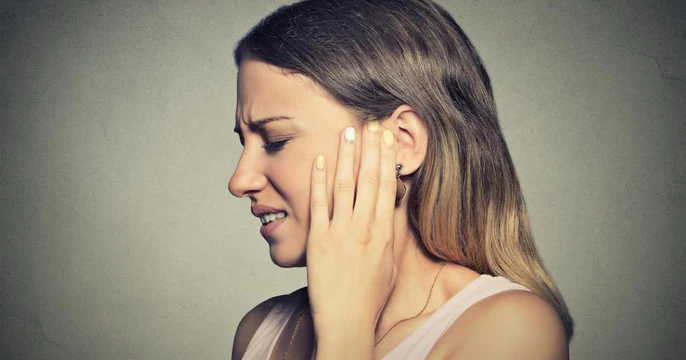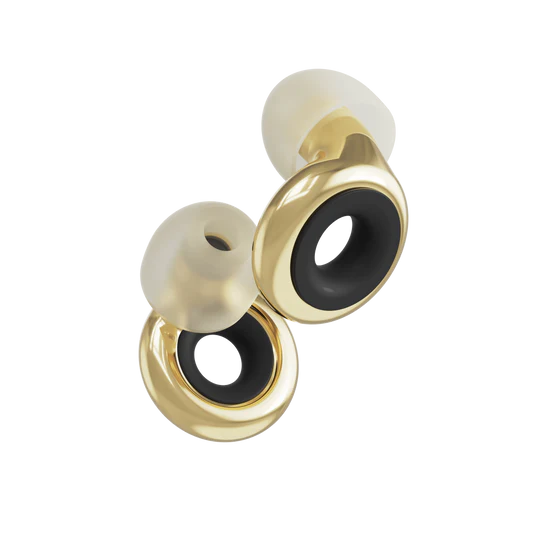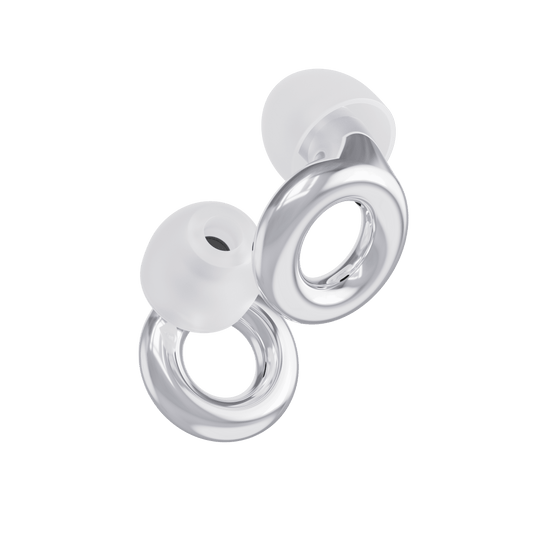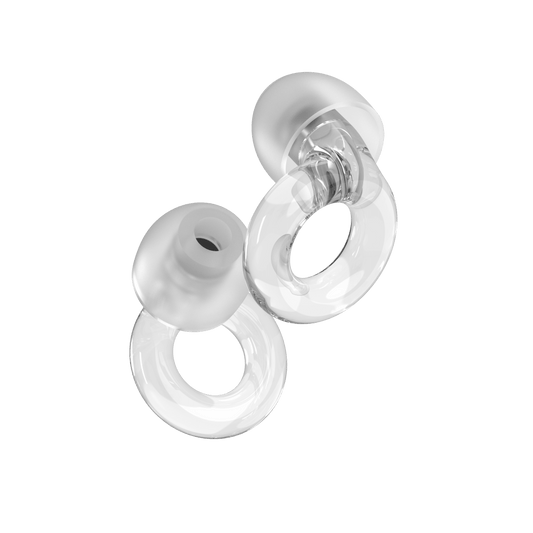Key takeaways
- Tinnitus can either be permanent or temporary
- The most common temporary causes of tinnitus include ear infections, a buildup of earwax and certain medications
- With temporary tinnitus, your symptoms will usually subside once the root cause of the tinnitus has been addressed
- Permanent tinnitus is usually caused by noise-induced hearing loss or age-related hearing loss, although it can also be caused by some medical conditions
- There is no cure for permanent tinnitus, although there are things you can do to relieve your symptoms
- Exposure to loud noises can also cause tinnitus: at first this is usually temporary, but with continued exposure, it may end up becoming permanent
- That means it’s crucial to protect your hearing when you’re in loud environments like nightclubs and concerts – and the best way to do this is with earplugs!
If you’re experiencing an annoying ringing in your ears, it’s likely to be tinnitus. And if you have this condition, there’s probably one question that’s on your mind: will tinnitus go away? Let’s get to the bottom of it.

Does tinnitus go away?
If your ears are buzzing and you’re wishing it would go away, we get it. After a while, you start to think “is this going to last forever?”.
The answer is, it depends. It all comes down to the cause of your tinnitus.
It’s sometimes thought that tinnitus is only caused by exposure to loud noises, like when you experience ringing in your ears after going to a concert.
It’s true that noise exposure is a common cause of this frustrating condition, but there are also other reasons you might experience the symptoms of tinnitus. With some of them, your tinnitus may only last as long as its cause. If you fix the reason for your tinnitus, you’ll likely be symptom free and hearing perfectly again.
On the other hand, some causes of tinnitus may mean that you’re unfortunately facing a chronic, long-term condition.
What are the main causes of temporary tinnitus?
Sometimes, you might have to deal with tinnitus for a short period of time, and then it’ll go away. Common causes of temporary tinnitus include:
Earwax
If the buzzing in your ears is caused by a buildup of earwax, then you might just need to get the impacted wax removed to relieve your symptoms. Too much earwax can block the ear canal, which affects your hearing, and makes it more difficult for external sounds to reach your eardrum. That means that internal sounds – like the bothersome buzz of tinnitus – can become more noticeable.
When it comes to ear wax, the advice is usually to leave it well alone. That is, unless it’s causing you issues. And tinnitus is definitely an issue.
So, if you have ringing in your ears, the first thing you should do is speak to your doctor or audiologist. They’ll take a look inside your ears, and if they notice there’s excess ear wax, they’ll probably recommend that you have it removed.
Once it’s been removed, the ringing should stop, and you’ll be back to living a life free from that irritating ringing.
Ear infection
Ear infections can also cause temporary bouts of tinnitus, for similar reasons.
Often, when you have an ear infection, there will be a build up of fluid in your inner ear. There can also be swelling. Both of these things can make it more difficult to hear normally, and they may make internal sounds more prominent. And, once again, that can bring on that annoying ringing in your ears.
However, once you’ve treated the cause of the infection, your tinnitus will go away on its own – usually. There are some cases where the infection causes long-lasting damage, and permanent tinnitus, but in most cases, the tinnitus will go away when the infection does.
Perforated eardrum
Another ear-related issue that can cause temporary tinnitus is a perforated eardrum. This is when there’s a hole in your eardrum, which can be caused by an ear infection, a sudden loud noise in your ear, an injury (like sticking a Q-Tip too far into your ear), or a change in pressure (like on a flight).
Perforated eardrums usually heal within a few weeks (and often without any treatment) but one of the side effects can be tinnitus. Once your ear gets better, the tinnitus usually does too.
Medication
Some medications can cause tinnitus. These are known as ototoxic medicines (where ‘oto’ means ear, and ‘toxic’ means harmful).
They can cause tinnitus as they may damage the sensory cells within your inner ear, which are essential for balance and hearing. They may also cause changes to your blood flow and blood pressure, which can result in a whooshing sound that’s heard in your own ears.
Tinnitus caused by medication may be more common than you think, as there are lots of ototoxic drugs such as:
- Analgesic drugs (painkillers) including ibuprofen and high-dose aspirin
- Aminoglycoside antibiotics which are used to treat some bacterial infections
- Chemotherapy drugs
- Anti-malarial medications
- Antidepressants, including fluoxetine (Prozac), sertraline hydrochloride (Zoloft) and nortriptyline (Pamelor)
- Benzodiazepines such as alprazolam (Xanax), diazepam (Valium) and lorazepam (Ativan)
- Beta blockers
Some of these medications are more likely to cause tinnitus than others, which are lower-risk – and in most cases, your tinnitus will stop when you stop taking the medication. Speak to your doctor if you’re concerned about ringing in your ears that has come on suddenly after taking medication.
Medical conditions
Some medical conditions can cause tinnitus. The most common of these are:
- High blood pressure
- Cardiovascular disease
- Diabetes
Often, if you have tinnitus that’s caused by a medical condition, it’ll stop once you start treatment, manage your symptoms, or recover fully.
Signs that tinnitus is going away
Maybe you’ll just wake up one day and the ringing in your ears will have stopped. Lucky you!
Or perhaps you’ll gradually notice signs of tinnitus going away. If you have temporary tinnitus, signs that your hearing may soon return to normal include:
- The volume of the ringing or buzzing sensation decreasing
- Pressure in your ears starts to improve
- It doesn’t bother you as much
- You’re able to sleep better and can relax without your tinnitus interfering
- The ringing in your ears has only lasted for a few hours or a couple of days
When is tinnitus permanent?
Now for the bad news: sometimes tinnitus doesn’t go away.
Permanent tinnitus is more often caused by hearing loss. There are two main causes of hearing loss induced tinnitus: age-related hearing loss, and noise-induced hearing loss.
Age-related hearing loss
Age-related hearing loss describes the process that naturally happens to many of us as we age. It’s when the hair cells inside your ears (known as the cochlea) start to break. These hair cells are crucial for receiving sound waves, which your brain understands as sounds. So, when the hair cells break, you can suffer hearing loss.
Unfortunately, as well as hearing loss, you may also have the side effect of developing tinnitus, as your brain is exposed to random electrical signals.
Noise-induced hearing loss
Noise-induced hearing loss is just as it sounds: hearing loss that’s caused by exposure to loud noises.
It can be caused either by a single exposure to a loud noise, like a jet setting off, or by lots of exposure to loud noises over time. Like age-related hearing loss, noise-induced hearing loss affects the structures of the inner ear which can cause tinnitus alongside your hearing loss.
Other causes of permanent tinnitus
When tinnitus is caused by hearing loss, of either type, it’s likely to be permanent. But hearing loss isn’t the only cause of long-term tinnitus. It can also be associated with Meniere’s disease, a rare disorder that affects the inner ear. As well as tinnitus, Meniere’s disease can also cause hearing loss, vertigo and a feeling of pressure inside the ear.
Permanent tinnitus can also be caused by a traumatic brain injury that affects the way your brain processes sounds.
What about concerts and festivals?
We’ve deliberately singled this one out.
We’ve all been there after a concert or festival. The evening watching your favorite band playing live, or dancing into the wee hours at a nightclub was amazing. But you’re left with a ringing in your ears immediately after you leave. And it’s still there the next day.
After short-term exposure to loud noise, like at a concert or a nightclub, your tinnitus will usually go away within 16 to 48 hours.
But if you’re exposed to loud noises again, and your tinnitus comes back, it might last a little longer next time. Eventually, if you’re frequently in close proximity to loud noises, it could become a permanent condition.
So, while tinnitus caused by exposure to loud noises like concerts, festivals, fireworks, nightclubs and bars is usually temporary, it could result in noise-induced hearing loss and permanent tinnitus with repeated exposure.
Is tinnitus reversible?
No. Although you may only have temporary tinnitus, and it may go away on its own, it can’t be cured. If you have permanent tinnitus, there’s no cure.
If your tinnitus doesn’t go away on its own after a few hours or days, then it’s time to see a doctor or audiologist. They can assess your symptoms, diagnose what type of tinnitus you have, and answer questions about whether your tinnitus is permanent or temporary.
While there’s no cure for permanent tinnitus, there are lots of treatment options to help you relieve your symptoms. Your doctor or audiologist will help you to decide which is the right treatment for you.
There are also plenty of things you can do to prevent you from getting tinnitus in the first place. These include:
- Treating your ears well – that means don’t stick Q-tips in them and be sure to clean your earbuds or hearing aids regularly! If you can avoid ear infections, you may also avoid a bout of tinnitus.
- Staying healthy: tinnitus can get worse if you’re stressed, and it can improve when you’re exercising regularly, eating well and getting plenty of sleep.
- Protecting your ears: exposure to loud noise can cause hearing loss and tinnitus. So make sure to wear earplugs if you’re going to be exposed to noises that are 80 decibels or louder. Earplugs like Loop Experience offer up to 18 db of noise protection while still allowing you to hear everything that’s going on around you – so there’s no need to miss out on the fun!
If you already have symptoms, you may want to wear earplugs for tinnitus to stop it from getting any worse.
Does tinnitus go away on its own? It depends.
There’s a lot of factors at play when it comes to answering the question of whether tinnitus ever goes away. It largely depends on the cause of your tinnitus. Some of those causes are things that you can’t do anything about, but when you get better or address the underlying cause of the problem, the tinnitus should disappear.
In other cases, your tinnitus is here to stay. It can be a debilitating condition for some people, but don’t worry: you’re not alone, and there are ways you can manage your symptoms to help you live a full, happy life.
Our earplugs

What is Tinnitus?
What is Tinnitus? Tinnitus is an audiological and neurological condition. It’s the perception of sound when no actual...

How is Tinnitus Diagnosed?
Learn about the diagnostic process of tinnitus, including tests and evaluations used by healthcare professionals.

Unveiling the Top 5 Causes of Tinnitus
Discover the top 5 causes of tinnitus and gain insights into why your ears ring. Expert advice for identifying trigge...




















